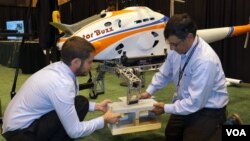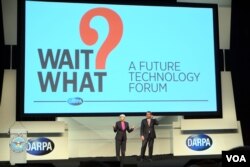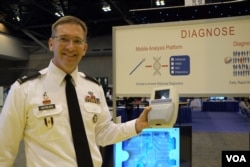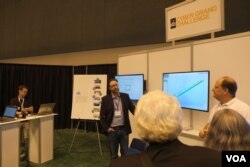Scientists and engineers from around the U.S. are in St . Louis, Missouri, this week to talk about advanced technologies taking shape in some of the nation’s most cutting-edge research labs.
The three-day conference — called “Wait, What? A Future Technology Forum” — is sponsored by DARPA, the Defense Department’s Advanced Research Projects Agency. It funds researchers in university and corporate laboratories whose work could affect national security.
But a lot of DARPA projects have an impact far beyond the military. For example, the Internet that billions of people use every day traces its roots to a network linking just four computers that DARPA set up in 1969.
Fast forward to the 21st century, and DARPA and its private-sector partners still have an eye on solving problems, many seemingly impossible. But as DARPA director Arati Prabhakar said, “We’re here to change what’s possible.”
'Outside the box'
Defense Secretary Ash Carter addressed the conference, pointing out the importance of tearing down barriers between the government and the private sector’s science and technology communities.
“Because we each have different missions and somewhat different perspectives, sometimes we may disagree. And I think that's OK. Whether we're developing a new product or a new policy, the lesson, to me, is always the same: Vigorous debate and exchange produce breakthrough ideas,” Carter said.
One breakthrough idea in the public health field is heading for better ways of diagnosing disease. Dr. Matt Hepburn, an infectious-disease specialist at DARPA, works on finding experts, in or out of government, who can develop innovative ways of fighting diseases like Ebola, chikungunya and influenza.
In the conference exhibit hall, Hepburn showed a prototype portable device that could dramatically reduce the time it takes to identify a patient’s disease, using just a drop of blood or a nasal swab.
“You put that swab on the card,” he explained. “And this card — a lab on a chip — you put into the machine, you press one button. Thirty minutes later, it says you have this or you have that [disease].”
That result can be sent via mobile phone to public health officials, who can track the spread of infection, nearly in real time.
High tech in the air
DARPA teams are also working on better ways of landing a helicopter. Hollywood may have given you the idea that helicopters can land anywhere, but it’s actually not that easy. They need a relatively level surface to land on, without a lot of big rocks or other obstacles.
On display was a small, remote-control helicopter with landing gear that adjusts to the terrain. Bendable legs with sensors keep the aircraft level, even if the ground underneath is not.
The design and testing of this “proof of concept” took a year, and the engineers — DARPA calls them “performers” — were a bunch of graduate students led by postdoctoral fellow Mike Ward at the Georgia Institute of Technology.
They still have more work to do. But program manager Ashish Bagai said that at this stage, DARPA doesn’t expect a fully finished product.
“But it is proof of concept,” he said. “It is: What is your vision? And can you show that it can be done and be made to work as a first step toward making it an optimal solution toward a real application?”
Innovation incentives
DARPA normally goes out and finds experts to work on its problems. Sometimes, though, the agency sets up a competition that anyone can enter, with as much as millions of dollars in prize money up for grabs. They did it with self-driving vehicles, for example.
It’s actually a revival of an old incentive for innovation.
In 1927, an American aviator crossed the Atlantic by himself in a daring flight that the world followed by radio. Charles Lindbergh’s flight on a plane called the Spirit of St. Louis was done in pursuit of a $25,000 prize posted by a New York hotel owner, Raymond Orteig.
At this week's conference, DARPA's Michael Walker explained the Cyber Grand Challenge. It’s a competition to develop software that will detect and fix bugs that might allow unauthorized access to a computer system. There are experts who can do this, but they are in short supply, and they aren’t fast enough.
Teams are working their way toward the competition finals, to be held next year. The code-cracking systems will compete against each other, Walker said, not against the human experts they are designed to replace.
“We don’t think they’re going to be good enough to play against people for quite some time,” Walker said. But we want to see if this concept is viable at all, if computers can even do this autonomously, because they’ve never been asked to before. So any kind of capability would be a first.”
DARPA encouraged experts from a wide spectrum of disciplines to attend this conference. Sometimes, the smarter way to solve, say, a medical problem may involve smart people from different fields who have a new way of looking at a problem that might just work.














